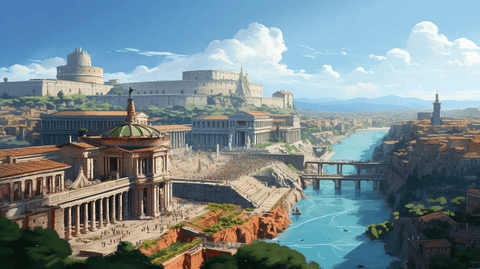
Caesar Augustus: Rome's First Emperor and Architect of Peace
Caesar Augustus, born Gaius Octavius in 63 BC, rose from the ashes of the Roman Republic to become its first emperor, ruling from 27 BC until his death in AD 14. His reign heralded the Pax Romana, a period of unprecedented peace and prosperity across the Roman Empire. This piece delves into his ascent to power, significant achievements, military victories, and the seamless transition of power to his successor, Tiberius.
The Path to Power
The assassination of his great-uncle Julius Caesar in 44 BC propelled the young Octavius into the political arena. Named Caesar's heir, Octavius, at 19, inherited not only his name and estate but also the loyalty of his legions. The formation of the Second Triumvirate with Mark Antony and Marcus Lepidus allowed them to defeat Caesar's assassins, leading to Octavius's eventual sole rule after a series of political maneuvers and military victories, notably the defeat of Antony and Cleopatra at the Battle of Actium in 31 BC.
Notable Achievements and Reforms
Augustus's rule brought about transformative changes across the Roman Empire. His administrative and social reforms laid the foundation for centuries of stability. Key achievements include the expansion of the empire, nearly doubling its size, and the institution of a census and taxation system that integrated the empire's far reaches. He also initiated an ambitious building program, claiming to have restored or built 82 temples in one year, and established essential services like the police and fire brigades.
Military Victories and the Pax Romana
Augustus’s military campaigns expanded the Roman Empire's borders, adding Egypt, parts of Spain, central Europe, and areas in the Middle East to Rome's dominion. His victory at the Battle of Actium was particularly pivotal, marking the end of civil wars and beginning a long period of peace known as the Pax Romana, which allowed the economy, arts, and agriculture to flourish.
Succession and Legacy
Augustus’s personal life was as strategic as his political life. His marriage alliances and adoptions were aimed at securing his lineage and the empire's future. Tiberius, his adopted son, succeeded him, continuing the Julio-Claudian dynasty. Augustus died in AD 14, leaving behind a legacy of a transformed Rome - from a city of bricks to one of marble. His reign not only secured Rome's imperial might but also fostered a golden age of cultural and economic prosperity.




